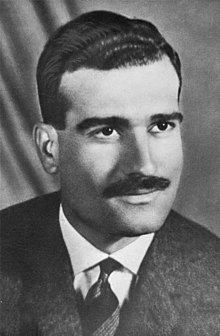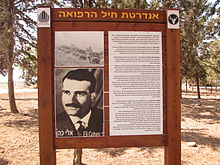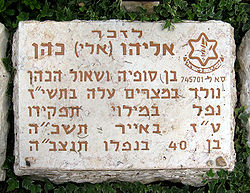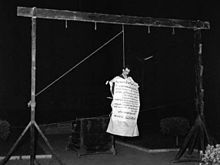Eli Cohen
![]()
The title of this article is ambiguous. For other meanings, see Eli Cohen (disambiguation).
![]()
This article or subsequent section is not sufficiently supported by evidence (e.g., anecdotal evidence). Information without sufficient evidence may be removed in the near future. Please help Wikipedia by researching the information and adding good supporting evidence.
Elijahu (Eli) ben Shaul Cohen (אֱלִיָּהוּ בֵּן שָׁאוּל כֹּהן; * December 26, 1924 in Alexandria; † May 18, 1965 in Damascus) was an Israeli spy.
According to many Israelis, Cohen's espionage activities contributed significantly to the success of the Six-Day War. In Jerusalem and many other Israeli cities, streets are named after him.

Eli Cohen

Image of Eli Cohen on a plaque of the 281st Medical Regiment on the Golan Heights.
Live
As a youth in Egypt, Eli Cohen was active in numerous Zionist organizations. After beginning his technical studies, he was recruited by the Haganah in 1944. Because of Zionist activities he was expelled from the university and dedicated himself to the immigration of Jews to Israel.
At the age of 33, he settled in Israel. It was not until late 1959, three years after his immigration to Israel, that Cohen, who spoke Arabic, English and French as well as Hebrew, learned that the Israeli secret service Mossad had been interested in him for some time, and began agent training.
Spy Activity
Under the alias Kamal Amin Thabet, Cohen appeared in Buenos Aires in early 1961 with a Syrian passport. As planned, he made contact with members of the Arab community. His knowledge of the Arabic language and customs made it easier for him to pass himself off as a wealthy Syrian citizen. There Cohen met the Syrian military attaché Amin al-Hafiz. At the end of December 1961, he traveled to Damascus via Beirut in the company of a wealthy and influential sheikh.
He moved into an apartment in Damascus opposite the headquarters of the Syrian army. Due to the surrounding embassies and consulates, his radio traffic was for a long time unobserved or could not be located. He turned this apartment into a popular meeting place for Syrian military officers and politicians. There they could meet their mistresses unobserved by their families. This strengthened their trust in him.
Eli Cohen had his own program on Syrian radio and was famous throughout the country. He was taken by a Syrian officer on reconnaissance tours to the Syrian-Israeli border on the Golan Heights and visited many Syrian positions with the latest Soviet weapons. Of course, he passed on his detailed information to the Israeli intelligence agency, Mossad. He also successfully suggested that the positions be shaded by planting eucalyptus trees. His accurate information about armament and the locations of the defenses, now marked by trees, helped Israel to a quick victory on the Golan Heights.
Neither his family nor his neighbors in Israel knew of his espionage activities. Only his brother, a Mossad agent deciphering messages from Damascus, learned that Eli was there because he was sending him personal messages.
On January 24, 1965, Eli Cohen was located and overpowered when, as a result of a power cut or radio communications interdiction, all radio signal sources except his battery-powered transmitter went silent. Four months of torture and a show trial followed. Cohen was sentenced to death by hanging. Pleas for clemency from Pope Paul VI and numerous governments were unsuccessful.
On May 18, 1965, thousands of people in Syria watched via television the public execution in Martyrs' Square in Damascus. In the Arab states this met with enthusiastic approval. In Israel, Cohen has been revered as a hero ever since.
The Israeli government tried through diplomatic channels to have Cohen's body brought to Israel. When this failed, four agents were supposed to kidnap the body, but this failed. As a result, Cohen was buried in an unknown location. Still, more than half a century after his death, family, friends and the Israeli government are trying to return Eli Cohen's body to his homeland for a proper burial according to Jewish custom.

Memorial at the Herzlberg in Jerusalem

Public execution of Eli Cohen in Damascus on May 18, 1965.
Search within the encyclopedia